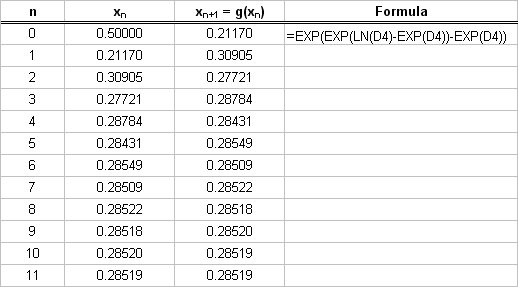Solve log[exp(x)+logx]=logx-exp(x) ??
1 Answer
x = 0.28519
Explanation:
We have:
log(exp(x)+logx) = logx-exp(x)
Assuming that all logarithms are natural logarithms, then equivalently:
ln(e^x + lnx) = lnx - e^x
This equation cannot be solved analytically, so first we graph the functions to get a "feel" for the solutions:
So, we establish that there is a single solution,
x = g(x) and use an iterationx_(n+1) = g(x_n)
There will many functions,
Here we try the following iterative equation:
ln(e^x + lnx) = lnx - e^x
:. e^x + lnx = e^(lnx - e^x)
:. lnx = e^(lnx - e^x) - e^x
:. x = e^(e^(lnx - e^x) - e^x)
So we attempt
x_n \ \ \ \ = 0.5
x_(n+1) = exp(exp(lnx_n - exp(x_n)) - exp(x_n))
And using excel, working to 5dp we get:



